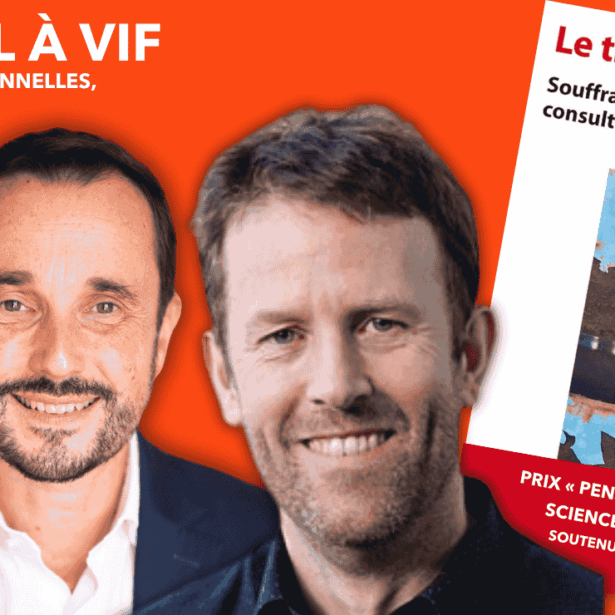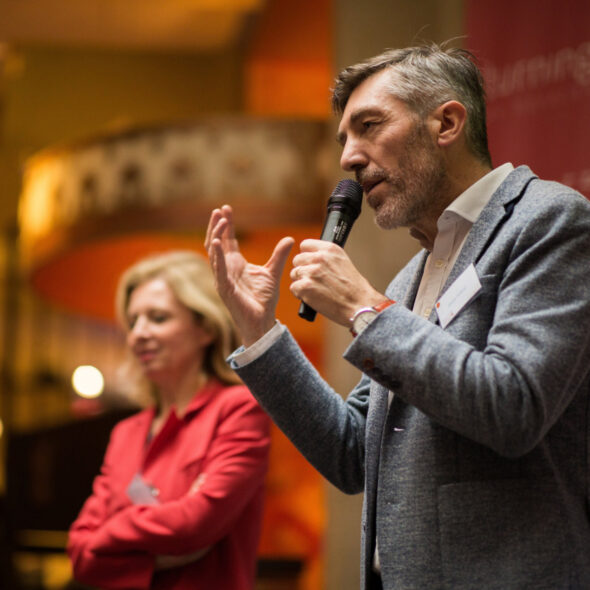Transforming News
In this episode of EdTalks, Ana Loback joins Patrick Burns for a fascinating conversation around the evolving role of today’s leader. #futureofwork #leadership #podcast

Ana Loback, Managing Partner of Turningpoint UK and Business Psychologist, joins Patrick Burns, Sales Director at EdCast, to discuss the Future Of Work from a Leadership perspective and shares valuable insights and predictions on how to intentionally shape the world of work and how to adapt in this disruptive time
Click here to access the podcast.
Here is a transcript of the podcast.
Hybrid work really has two components; there is the operations and organizations side, like where we are working, what tools we use, etc. and then there is the behavioral side, which touches more on Turningpoint’s expertise. Our work with large multinational groups allows us to see emerging patterns from working with so many leaders across the world.
We are seeing that the way leaders think about their leadership is changing – and needs to change, and this is indeed the biggest challenge: to change mindsets. After the global pandemic, people are already asked to work differently and behave differently, and now we are also asking people to think differently… almost overnight!
Several large organizations have asked us to conduct large-scale analysis on cultural attributes and identify how these are already evolving strongly within organizations. We see interesting changes in cultural attributes like the sense of what to expect when relating to people, notably the strength of informal conversations, the strength of debates during brainstorming and decision-making, the different dynamics between informal coffee talk and actual meeting discussions…
There are also some deep changes emerging when it comes to trust-building. Trust-building can become a challenge when people are no longer physically working in the same place. Trust being the social glue between the known and unknown; the way we build trust needs to change due to the new hybrid ways of working. In today’s corporate world, there is a stronger need to include multiple stakeholders to make complex decisions and faster decisions, so people need to develop more and more strong and trusting relationships in this new context.
How are leaders helping their teams to create trust in this new hybrid world?
In our experience at Turningpoint, and this translate to different levels of responsibility, we have identified a couple of golden rules, when it comes to rethinking our idea of working and creating relationships. We have been inspired, among others, by Adam Grant (Think Again, 2021) – we need to challenge assumptions and reset mindset, basically what we call unlearning.
Ana’s Five Golden Rules for making Hybrid Work successful:
Rule #1: Trust your people! Clarity is empowering, and with a strong framework, you make people feel independent and responsible. Let go of HOW work is done and focus on WHAT is done. Feedback is an important component here, asking, receiving and giving feedback.
Rule #2: Define your principles – this is closely connected to Rule 1. You need clear guidelines on ways of working, projects, timelines, and deliverables so that there is no confusion even when each team-member is working on their own.
Rule #3: Be ready to challenge assumptions, your own and those of others!
Rule #4: Re-organize your work and way of working! Prioritize, loose control… make events out of co-creation, workshops… Make being at the office really matter. Build sense of belonging.
Rule #5: Test and learn: and be ready to learn from mistakes, because we all make them. Learn publicly: it helps build trust!
We talk a lot about the disadvantages of Hybrid Working, but what are the advantages?
We see that hybrid working can boost productivity, be empowering, develop independence and an increased sense of proximity when the manager has successfully built the organization and support system needed, such as more one-to-one meetings with the manager or with buddy systems. An essential element here is to be ready to “make the first move” and to be intentional. With Hybrid Working, it may not be as natural as before, to avoid people feel disconnected and feeling alone.
Ana’s predictions for Hybrid Working
Last year, we witnessed the “big resignation”, multiple lockdowns and the aftermath and reflections that came out of that, I believe, are here to stay. For example, there is an increased sense of empathy, having experienced such a massive shock collectively. This experience has pushed so many to shift the focus towards well-being and a search for a sense of meaning, purpose.
This macro-trend of wanting to find meaning and purpose is definitely here to stay. People are more and more looking for connectedness, to find what energizes us at work, and this is of course closely connected to leadership. Today leaders really need to tap into drivers and motivators to engage their teams and have ability to help people connect to meaning and purpose. The ability to empower others, demonstrate the why, connect to bigger picture, and all key here. Through our work at Turningpoint, we are seeing a stronger need for purpose-driven leadership becoming very important at very senior levels.
It is interesting to observe that learning agility, a leadership skill that has gained momentum over the last decade, is actually becoming a key leadership skill more than ever.
Another macro-trend is leading with health and “co-missioning” your people. Making every task or project mission-driven and demonstrating why is each task important in the bigger picture. Leaders need to give the direction rather than the destination, and by giving a clear vision and space for executing, even when, and especially when, it feels uncomfortable.
If leaders take the time to design work according to strengths within the team and really design the time spent together, hybrid working can be an amazing lever to create true empowerment, autonomy, and responsibility, and thus also increase productivity and strengthen performance.

Transforming News
"This seminar gave me a deeper understanding of how I function, and how others on my team do, too.."

Inspiring News
Reimagining work-life quality through real-life experiences

Transforming News
Why do so many capable, committed women still find themselves stuck on the path to leadership?

Transforming News
Interview with Ama Ocansey, Head of Diversity & Inclusion at BNP Parisbas CIB

Inspiring News
Michael Bertrand has been appointed as Director of Coaching and Programs at Turningpoint Asia
…
Turningpoint’s approach to transformation is based on the systemic, appreciative and narrative methods of resource-oriented collective intelligence, as opposed to the more traditional corrective approach. These approaches and tools can be deployed for teams and large groups.

Turningpoint specializes in executive individual and group leadership and coaching and development.